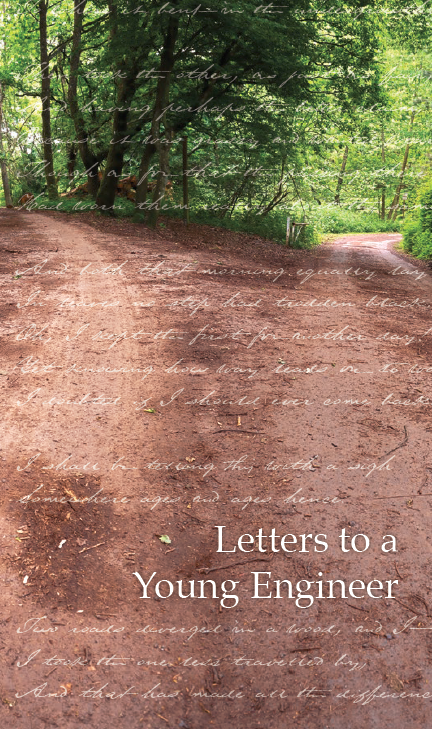Letters to a Young Engineer
 The 2021 Edition is here!
The 2021 Edition is here!
Each year, more than two million engineering students graduate across the world. As the population of the planet grows, these new engineers will be called upon to develop new technologies and to build and service cities much larger than today’s. As both environmental and man-made events unfold with greater intensity, they will be called upon with greater urgency. Their careers will be more turbulent, fast-paced and impactful than ever before.
In Letters to a Young Engineer, an array of experienced engineers provide their advice and words of encouragement to the next generation as they begin their careers in the midst of this fast-changing world. Whether they are working in private enterprise, teaching in some of Canada’s finest academic institutions or taking an active role in the governance of communities and professional organizations, the contributors to Letters to a Young Engineer offer insights that can only be achieved after years of experience and leadership in the field.
“Some of us write to a daughter or son, some write to our students, some to our future employees or customers; but all of us write to you, the graduate. You are the future. In you we trust our profession, and as you will see in the next few years, much of the planet’s future is now entrusted to you,” says the book’s editor, Dr. Daniel Hoornweg, Associate Professor and Richard Marceau Research Chair, Faculty of Energy Systems and Nuclear Science, Ontario Tech University.
“The letters in this book are given freely but not without cost,” Hoornweg explains. “In our careers we have seen inadequate gains in the provision of basic services such as water, sanitation, health, education and security for all; a billion people still live in extreme poverty; the planet’s ecosystems are severely strained; and more than two billion able adults are under- or un-employed.”
The next generation of engineers “will be called upon increasingly to learn, to lead, and to live with integrity and aptitude” says Hoornweg. And the letters in this book were “written with heartfelt hope and a smattering of suggestions for [their] upcoming careers.”
Published by Ontario Tech University, Letters to a Young Engineer has become an annual publication distributed at select Universities in Canada and the aim is, perhaps one day, to distribute the book to all engineering graduates around the world.
To obtain a printed copy of Letters to a Young Engineer, please send $8 CDN (includes S&H), to ‘Letters to a Young Engineer’, FESNS, Ontario Tech University, 2000 Simcoe Street North, Oshawa, Ontario, L1H 7K4. To obtain an electronic version, you may download a PDF of the 2021 edition here. Archived editions also available for download: 2020, 2019, 2018, 2017, 2016, 2015 and 2014.